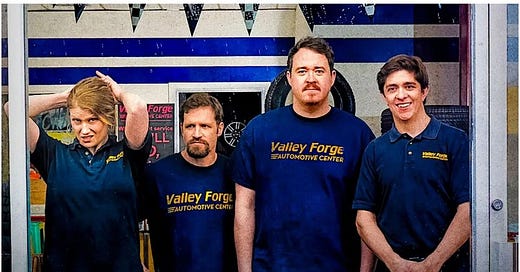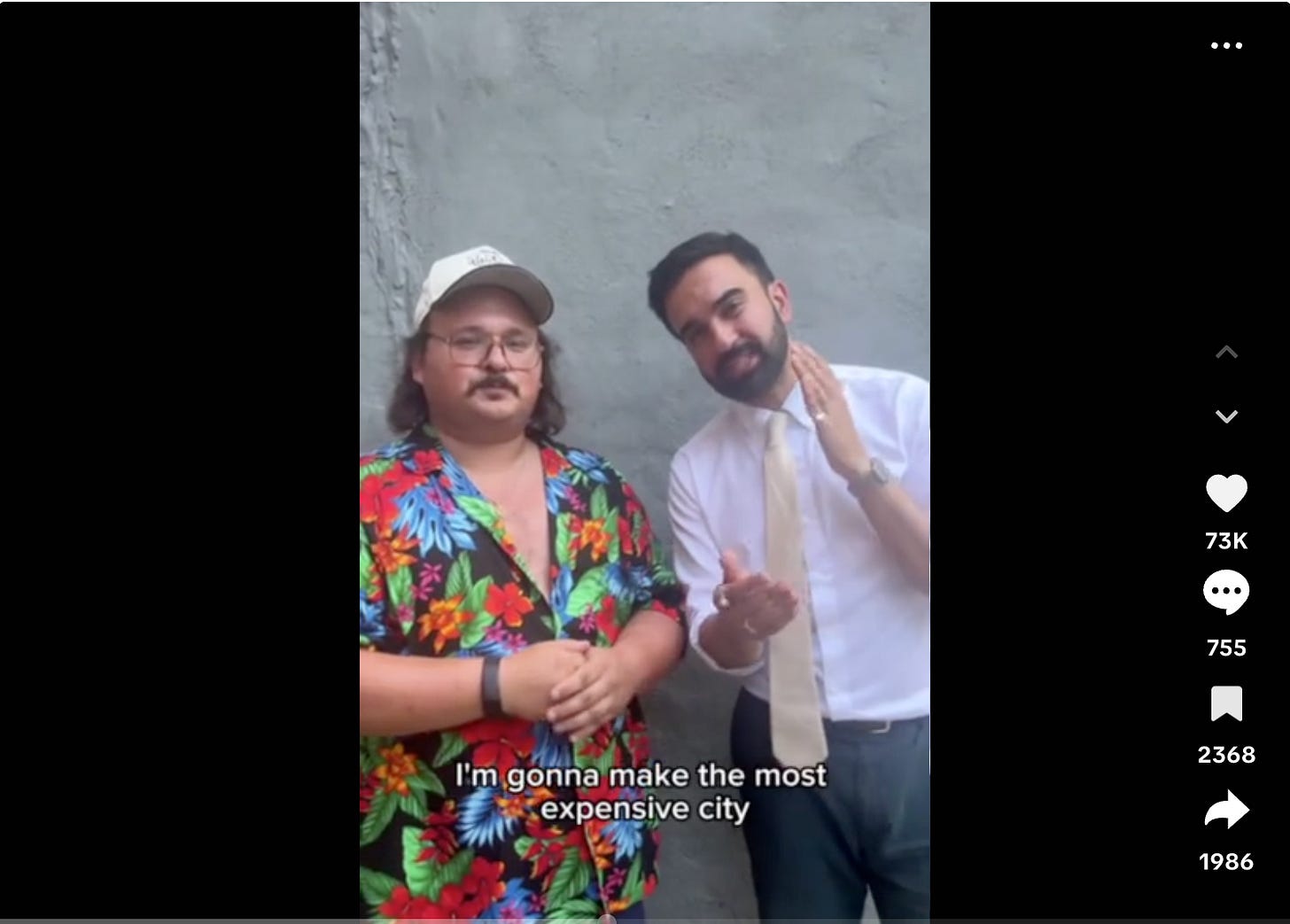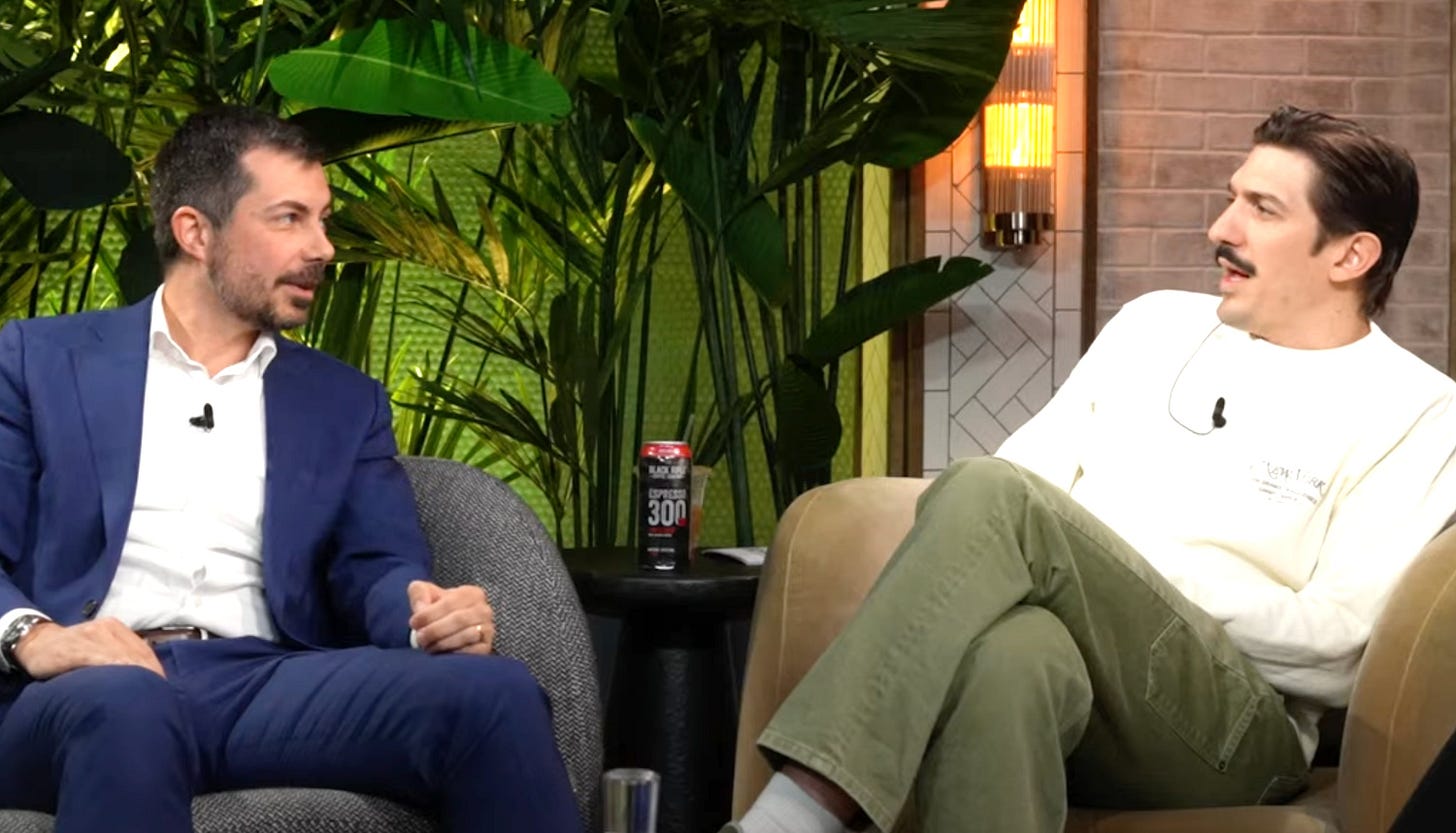Democrats Need to Win the Guys of Tires:
Buttigieg and Mamdani are courting male comedians who are offensive, but have heart
The second season of Tires, a workplace comedy about the guys working at a tire shop, recently dropped on Netflix. The show is a vehicle for Shane Gillis, who plays a lazy mechanic who spends his days avoiding work and torturing his cousin Will, the store manager played by straight man Steve Gerben (fun fact: the show is filmed at Gerben’s father’s real auto shop). The cast is rounded out by Stavros Halkias as Dave, a philandering and scheming but competent store manager, and Andrew Schulz as Andy, a weaselly used car salesman.
There’s a lot in the show to take issue with. The content is profane, littered with racial and ethnic jokes, and the women are mostly plot devices. An episode is centered around them bribing the HR facilitator to pass them after they mock the training session (a particularly acute dagger for Democrats derided as the party of HR). And yet, it has heart, the show might give some insight to how guys are performing masculinity and power in modern America.
Despite being the lead, Shane is no alpha. He adopts a pet turtle (his new best friend, “Jerome Bettis”) and lamely buys a gun he can’t use, because it seems cool. He spends the season pursuing a woman he refers to as his girlfriend, despite his time spent lurking outside of doorways practicing what he’ll actually say to her. And when Will is getting humiliated onstage by an actual alpha bro, Shane pulls the fire alarm to end his agony. He’s an insecure bro with a code. John McKeever, the writer/director, said “There’s a few rules that we follow and that we generally believe in. And one of them is like, ‘Is this funny or is this mean?’ If it feels mean, it’s got to go. If it’s to make a point, you know, if it’s to make some lame political point — one way or the other — where you’re trying to get people watching, not to laugh, but to go, ‘Hmm, I agree with that.’ Then that fucking sucks.” Young men are consuming apolitical content like this that nonetheless goes to shaping their worldview in tangible ways.
Gillis–who was fired after five days at Saturday Night Live for offensive old jokes–created and writes the show, and plays the eponymous Shane. Although the SNL experience made him a martyr for those decrying cancel culture, Gillis’ comedy is politically more nuanced. In his Netflix special, he offhandedly mentions that he’s not a Republican (“yet”) and that he doesn’t believe being gay is a choice. He sardonically jokes about Americans’ blithe acceptance of mass shootings, and as a history buff enamored of the Founding Fathers, he asks, “We’re not gonna let human trafficking define these guys are we?” Similarly, he criticized Trump’s aims to develop Gaza as a resort. And importantly, although Echelon found that fans of comedians like Gillis and Theo Von preferred Trump, 41% supported Harris. The audience for this humor is not lost or irredeemable, but the comedians themselves can be engaged with and influenced as well.
Halkias, aka Stavvy, is a comedian who has been outspoken in his left-leaning politics. This week he endorsed Zohran Mamdani (one reason: he’s “not a disgraced sex pest”) in the New York City mayoral race. It’s notable not only because Stavvy is weighing in on a political campaign but also because Mamdani appears in a video with a guy who used to host a show called Cum Town (Stavvy’s former cohost on the show also endorsed Mamdani). Regardless of one’s opinions on the NYC election (and SAM doesn’t have one – we don’t live or vote in New York), Mamdani’s embrace of the dirtbag left as a political constituency is notable against a backdrop where young men say that the inability to screw up is part of what turns them off from the Democratic party, which they also view as humorless. Particularly in a low-turnout primary during a heatwave, his calculus is that Stavvy’s audience is worth pursuing.
Andrew Schulz, another comedian with his own powerful podcast, currently ranked #20 on Youtube, and recently received the New York Times Interview treatment. In it, Schulz says of his interview with Pete Buttigieg, “that was awesome having Pete on. Smart guy. Meets you where you are emotionally. He doesn’t talk down or finger wag.” He also refutes that the show didn’t want to host Democrats and that his audience isn’t interested in hearing from them.
“I think it’s important to reflect multiple viewpoints on the pod. We desperately tried to do that in the last election. The Democrats that we asked were not willing to come on. Now they are starting to come, and that makes for much better podcasting. Also, the numbers when they come on are incredible. Clearly there’s a real thirst from our audience, and to me what that indicates about our audience is that it’s not this extreme one direction.”
These comedians’ humor may often make us uncomfortable, but it doesn’t have to appeal to all of us in order for us to understand the powerful influence it has, especially for young men. And indeed, we may find that in messy, low turnout elections, they could be among the most powerful messengers out there for this swingy demographic. Buttigieg (and some others) have shown that Democrats can engage–and perform well–with edgy comedians, and reap the benefits of reaching a new audience, while staying true to their values. It takes practice, but the time to start is now.






This article touches on a real phenomenon—comedy as a backdoor into young male identity. But it stops short of a full picture. I thought I would see myself in this piece—I didn’t. The focus stays mostly on white, working-class male performance, without acknowledging the broader population of young men—especially Black and brown—who are navigating masculinity under even more pressure, with far fewer cultural or comedic mirrors. If we’re going to talk about how young men form identity today, we need to account for how race, faith, and intergenerational trauma shape those performances too. The audience is wider. The stakes are higher.
Right now you are SSAM. not SAAM ⚡️⚡️